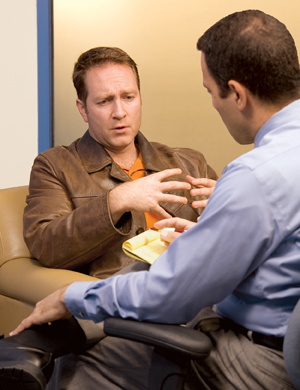Substance use disorder can be treated in many ways. No one treatment works for all people. Addiction can be a long-term condition with relapses that needs ongoing long-term care. What may work best for you can depend on many things. Treatment for most people may be done in several ways. These can include medicine and lifestyle changes. They can include private, family, and group therapy. Treatment can take place in different types of care settings.
Medicines
Medicines can help people who are trying to stop using a substance that's addictive. They help with withdrawal symptoms and can ease cravings. They can also blunt the effects of a substance.
Treatment can include these medicines.
|
Type of substance |
Medicines |
|
For heroin and other opioid use disorders |
Methadone Buprenorphine Naltrexone |
|
For alcohol use disorder (alcoholism) |
Acamprosate Disulfiram Naltrexone |
|
For nicotine withdrawal |
Bupropion Varenicline Nicotine replacement therapy |
Types of therapy and support
-
Motivational interviewing. This is a type of counseling. It helps you to change your behavior. The goal is to explore and resolve any mixed feelings you have about quitting drug or alcohol use. The therapist helps you figure out and focus on your own reasons for wanting to change.
-
Cognitive behavioral therapy (CBT). With CBT, you work on your problem behaviors. You learn ways to change them. For example, anger or stress may make you want to drink. A therapist can help you learn healthy ways to manage those feelings.
-
Community reinforcement approach (CRA). This method uses vouchers to help you follow a drug- or alcohol-free lifestyle. You get a voucher to use for a reward after each clean urine sample. This can help you stay sober while you learn new life skills.
-
Community reinforcement and family training (CRAFT). This therapy counsels and trains your family. The therapist teaches them how to support you to seek or keep doing treatment. This therapy helps your family spot times that may make you want to drink or use drugs.
-
Mutual support groups. These groups are run by people who are in recovery. Their goal is to support each other emotionally and socially. They share their experiences with substance use and recovery. They mentor others through the recovery process. Many of these groups are based on a 12-step process. There are many types of groups. Alcoholics Anonymous (AA) is an example. Some areas have gyms and fitness programs for the person in recovery. Members support each other to be sober through exercise and fellowship. Some give support for healthy eating. They may offer a chance to do community service.
-
Individualized drug counseling (IDC). This is a common type of therapy. It treats addiction as a disease. And it works on spiritual growth and behavior change using a 12-step process.
Places for treatment
Your health care provider will look at your needs. They will advise which of these can work best for you:
-
Outpatient care. This is also called intensive outpatient treatment. It may include weekly counseling in a health care office. Or you may have other types of sessions that happen more often.
-
Inpatient care. This may include a hospital stay. Or you may go to a residential treatment program. It is done to manage withdrawal with medicine.
Continuing care
Once you start treatment for a substance use disorder, you should receive ongoing care. It's the same as with someone with a chronic illness. This includes addiction counseling, psychotherapy, and medicines. You might go to a mutual help group three times a week, especially during the first years of recovery. Over time, your health care provider may change your care plan based on your needs. The provider will look at how serious your disorder is, your response to treatment, and how committed you are to ongoing care.


